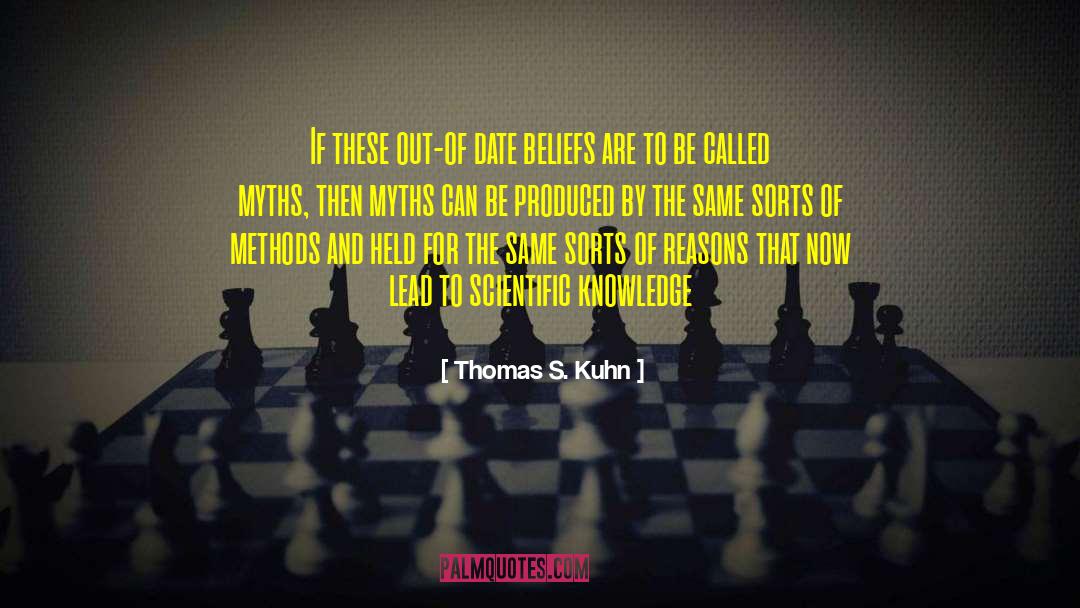Thomas S. Kuhn Famous Quotes
Reading Thomas S. Kuhn quotes, download and share images of famous quotes by Thomas S. Kuhn. Righ click to see or save pictures of Thomas S. Kuhn quotes that you can use as your wallpaper for free.
The man who is striving to solve a problem defined by existing knowledge and technique is not, however, just looking around. He knows what he wants to achieve, and he designs his instruments and directs his thoughts accordingly. Unanticipated novelty, the new discovery, can emerge only to the extent that his anticipations about nature and his instruments prove wrong ... There is no other effective way in which discoveries might be generated.
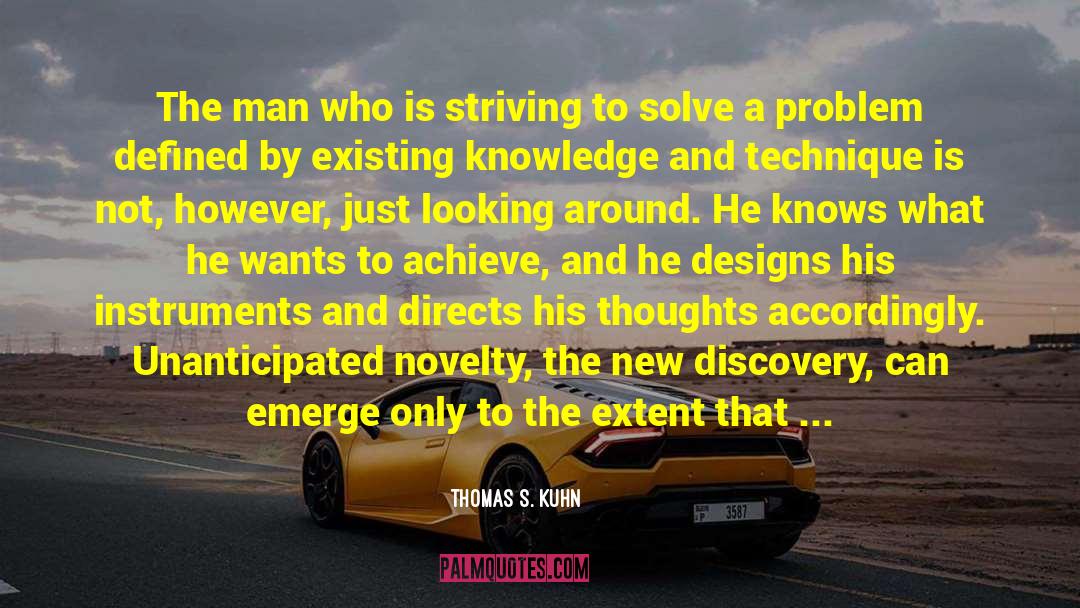
In these and other respects a discussion of puzzles and rules illuminates the nature of normal scientific practice. Yet, in another way, that illumination may be significantly misleading. Though there obviously are rules to which all the practitioners of a scientific specialty adhere at a given time, those rules may not by themselves specify all that the practice of those specialists has in common.
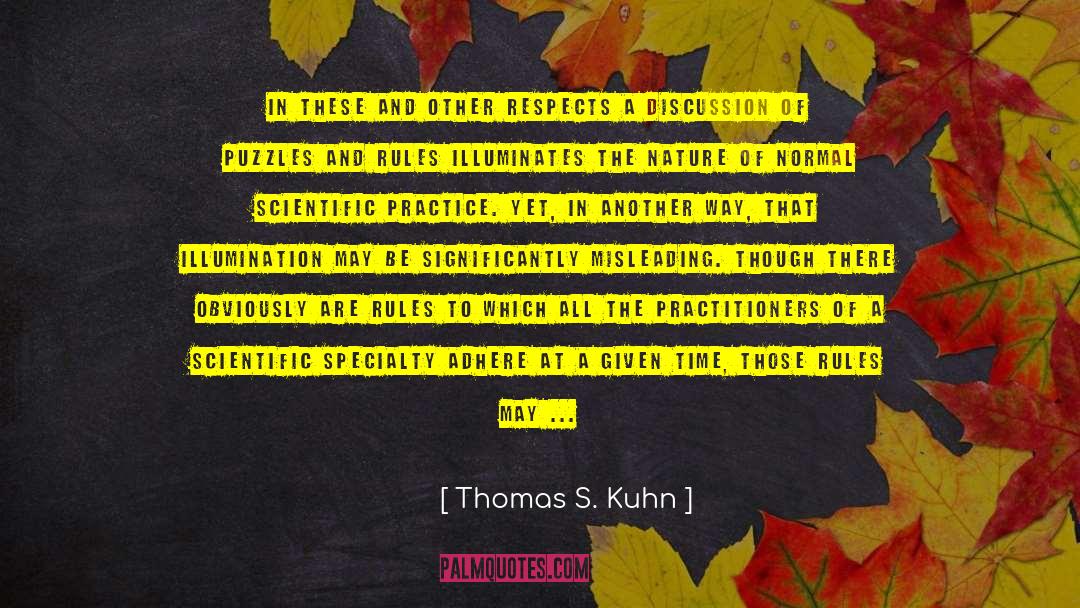
Newton's three laws of motion are less a product of novel experiments than of the attempt to reinterpret well-known observations in terms of motions and interactions of primary neutral corpuscles
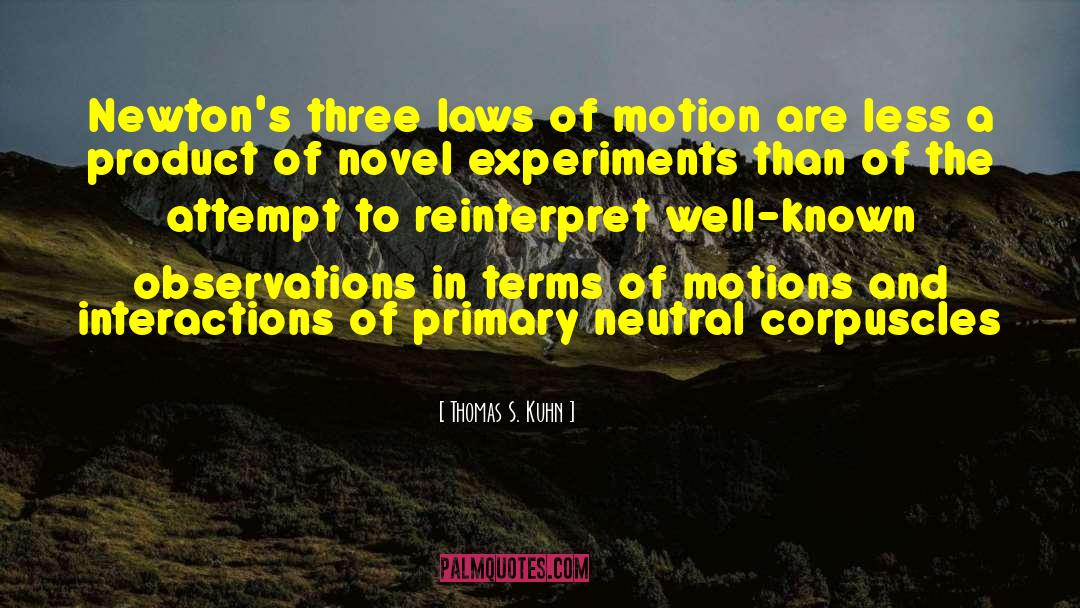
Unable either to practice science without the Principia or to make that work conform to the corpuscular standards of the seventeenth century, scientists gradually accepted the view that gravity was indeed innate

once it has achieved the status of paradigm, a scientific theory is declared invalid only if an alternate candidate is available to take its place.
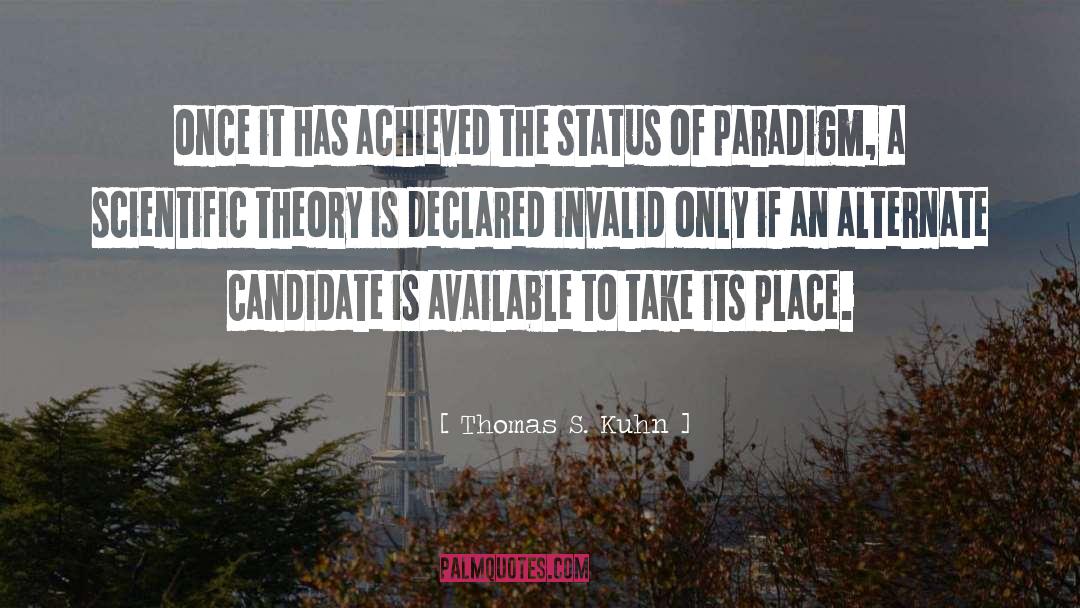
Gravity, interpreted as an innate attraction between every pair of particles of matter, was an occult quality in the same sense as the scholastics' "tendency to fall" had been
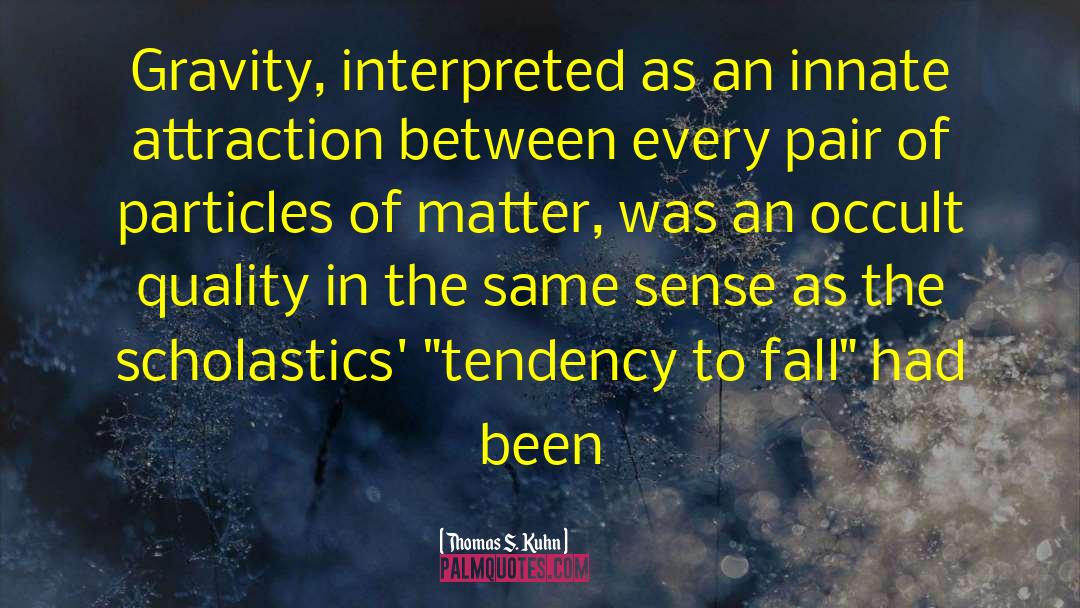
Paradigms are not corrigible by normal science at all. Instead, as we have already seen, normal science ultimately leads only to the recognition of anomalies and to crises. And these are terminated, not by deliberation and interpretation, but by a relatively sudden and unstructured event like the gestalt switch. Scientists then often speak of the "scales falling from the eyes" or of the "lightning flash" that "inundates" a previously obscure puzzle, enabling its components to be seen in a new way that for the first time permits its solution. On other occasions the relevant information comes in sleep. No ordinary sense of the term 'interpretation' fits these flashes of intuition through which a new paradigm is born. Though such intuitions depend upon the experience, both anomalous and congruent, gained with the old paradigm, they are not logically or piecemeal linked to particular items of that experience as an interpretation would be. Instead, they gather up large portions of that experience and transform them to the rather different bundle of experience that will thereafter be linked piecemeal to the new paradigm but not to the old.
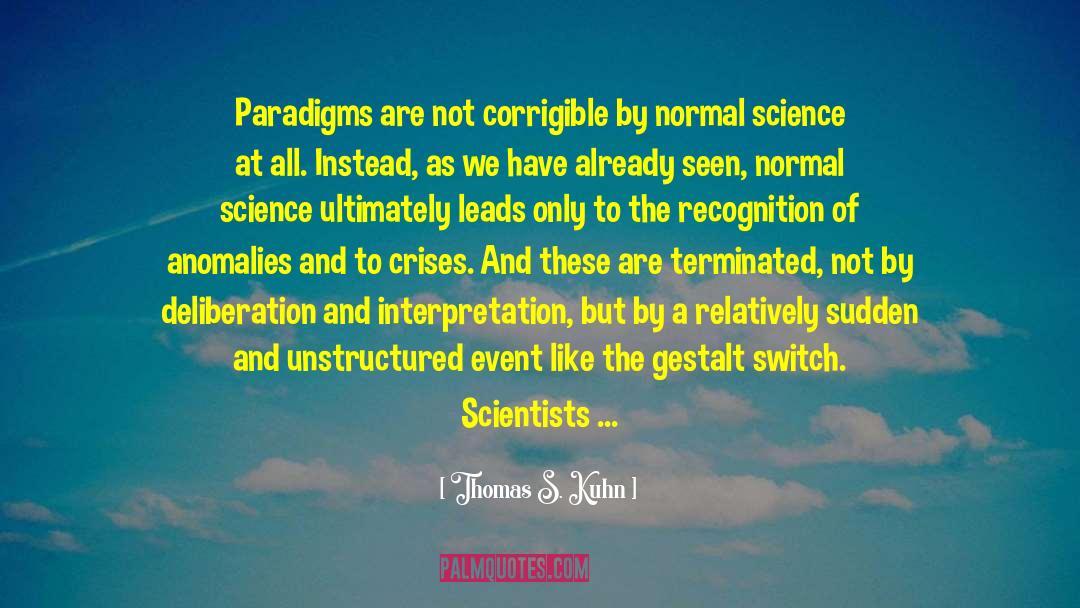
The man who succeeds proves himself an expert puzzle-solver, and the challenge of the puzzle is an important part of what usually drives him on.

Because scientists are reasonable men, one or another argument will ultimately persuade many of them. But there is no single argument that can or should persuade them all. Rather than a single group conversion, what occurs is an increasing shift in the distribution of professional allegiances.
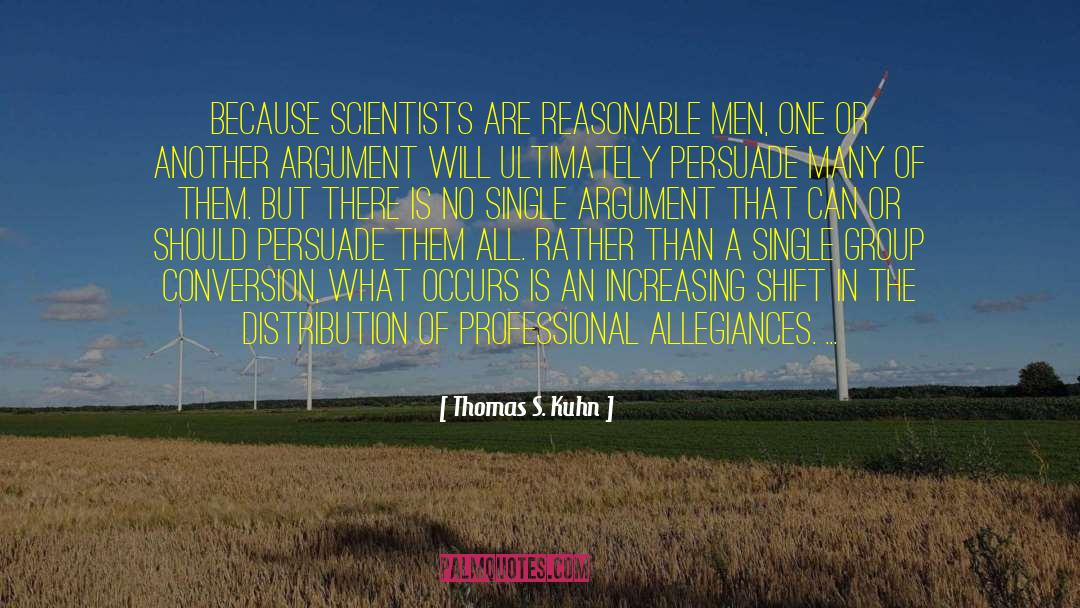
In recent years, however, a few historians of science have been finding it more and more difficult to fulfill the functions that the concept of development-by-accumulation assigns to them. As chroniclers of an incremental process, they discover that additional research makes it harder, not easier, to answer questions like: When was oxygen discovered? Who first conceived of energy conservation? Increasingly, a few of them suspect that these are simply the wrong sorts of questions to ask. Perhaps science does not develop by the accumulation of individual discoveries and inventions. Simultaneously, these same historians confront growing difficulties in distinguishing the "scientific" component of past observation and belief from what their predecessors had readily labeled "error" and "superstition." The more carefully they study, say, Aristotelian dynamics, phlogistic chemistry, or caloric thermodynamics, the more certain they feel that those once current views of nature were, as a whole, neither less scientific nor more that product of human idiosyncrasy than those current today.
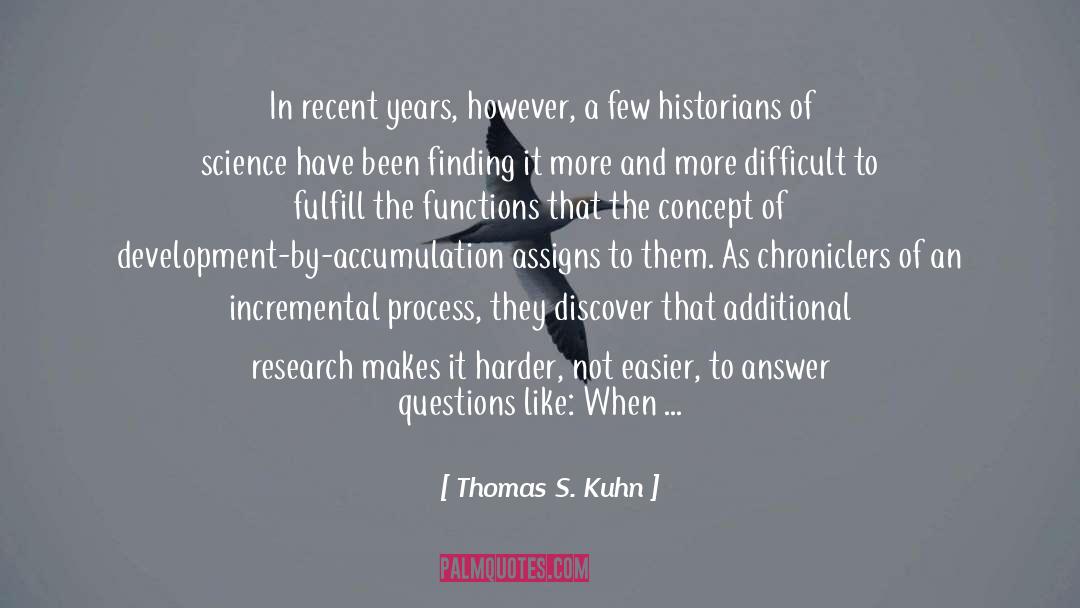
The scientific enterprise as a whole does from time to time prove useful, open up new territory, display order, and test long-accepted belief. Nevertheless, the individual engaged on a normal research problem is almost never doing any one of these things. Once engaged, his motivation is of a rather different sort. What then challenges him is the conviction that, if only he is skillful enough, he will succeed in solving a puzzle that no one before has solved or solved so well. Many of the greatest scientific minds have devoted all of their professional attention to demanding puzzles of this sort. On most occasions any particular field of specialization offers nothing else to do, a fact that makes it no less fascinating to the proper sort of addict.

Max Planck, surveying his own career in his Scientific Autobiography, sadly remarked that "a new scientific truth does not triumph by convincing its opponents and making them see the light, but rather because its opponents eventually die, and a new generation grows up that is familiar with it."8
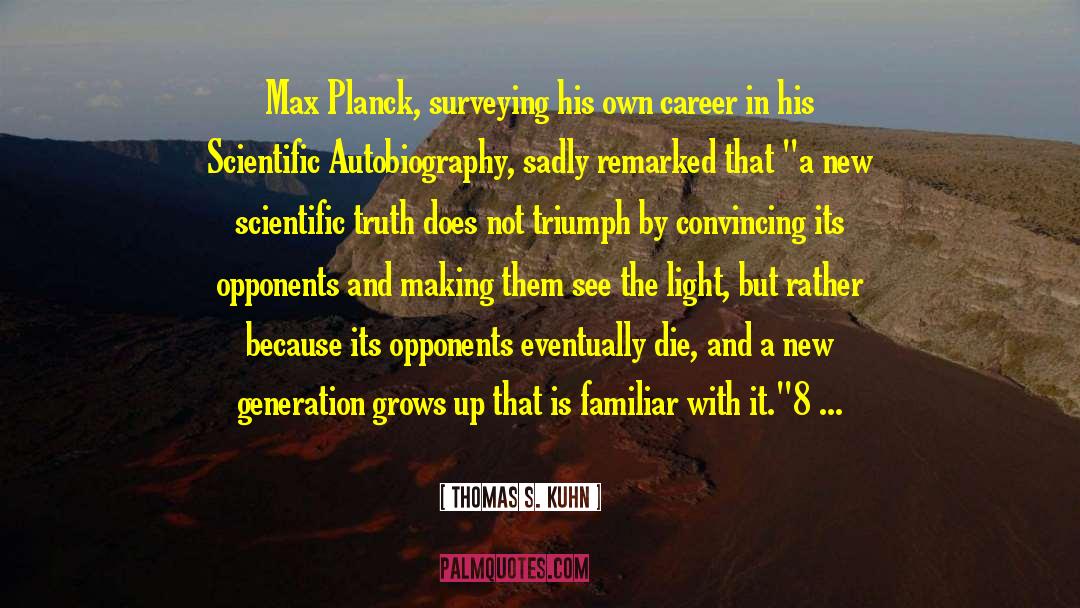
Perhaps science does not develop by the accumulation of individual discoveries and inventions

Observation and experience can and must drastically restrict the range of admissible scientific belief, else there would be no science. But they cannot alone determine a particular body of such belief. An apparently arbitrary element, compounded of personal and historical accident, is always a formative ingredient of the beliefs espoused by a given scientific community at a given time
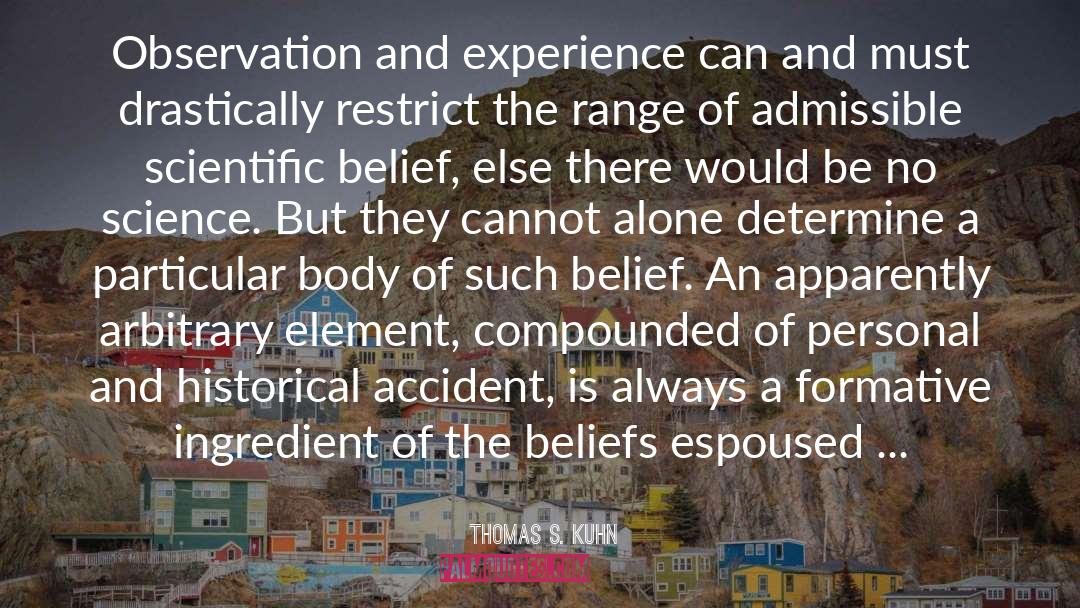
Why should a change of paradigm be called a revolution? In the face of the vast and essential differences between political and scientific development, what parallelism can justify the metaphor that finds revolutions in both?
One aspect of the parallelism must already be apparent. Political revolutions are inaugurated by a growing sense, often restricted to a segment of the political community, that existing institutions have ceased adequately to meet the problems posed by an environment that they have in part created. In much the same way, scientific revolutions are inaugurated by a growing sense, again often restricted to a narrow subdivision of the scientific community, that an existing paradigm has ceased to function adequately in the exploration of an aspect of nature to which that paradigm itself had previously led the way. In both political and scientific development the sense of malfunction that can lead to crisis is prerequisite to revolution.
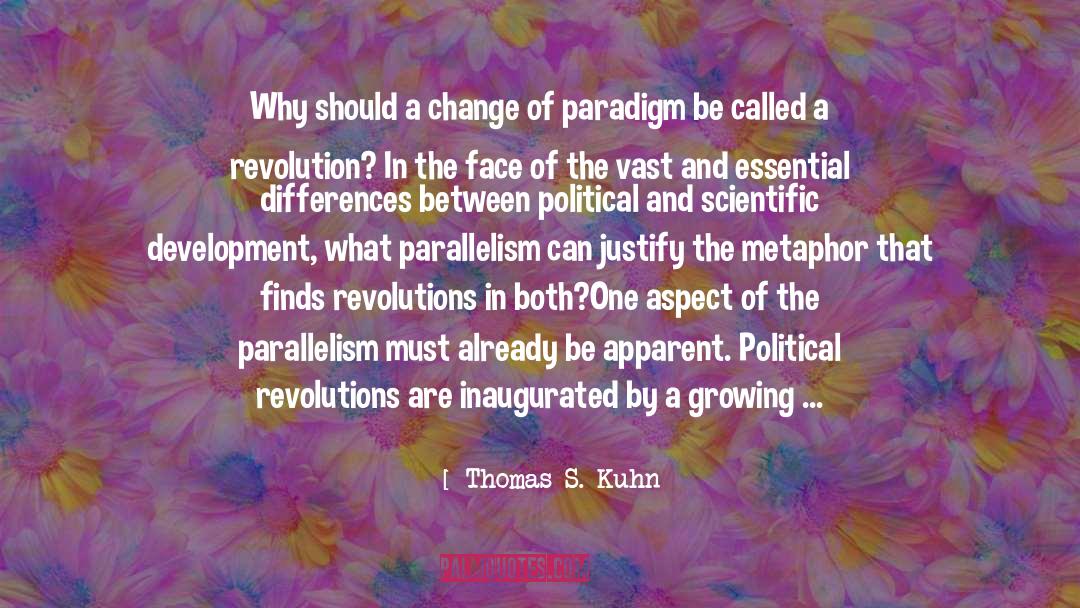
The depreciation of historical fact is deeply, and probably functionally, ingrained in the ideology of the scientific profession, the same profession that places the highest of all values upon factual details of other sorts.
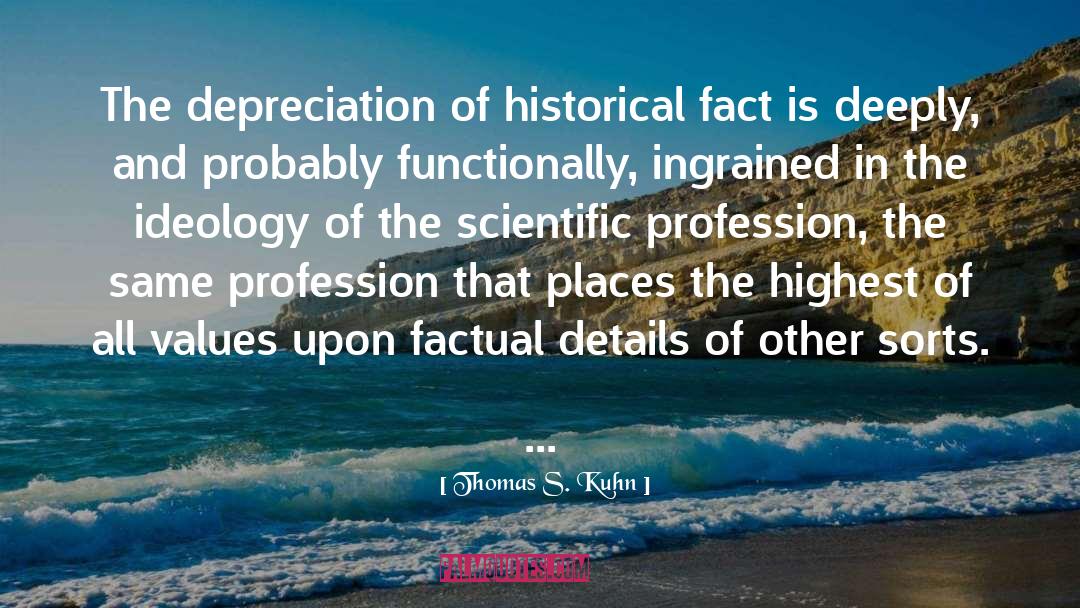
The answers you get depend on the questions you ask.

No wonder, then, that in the early stages of the development of any science different men confronting the same range of phenomena, but not usually all the same range of phenomena, describe and interpret them in different ways. What is surprising, and perhaps also unique in its degree to the fields we call science, is that such initial divergences should ever largely disappear. For they do disappear to a very considerable extent and then apparently once and for all. Furthermore, their disappearance is usually caused by the triumph of one of the pre-paradigm schools, which, because of its own characteristic beliefs and preconceptions, emphasized only some special part of the two sizable and inchoate pool of information,
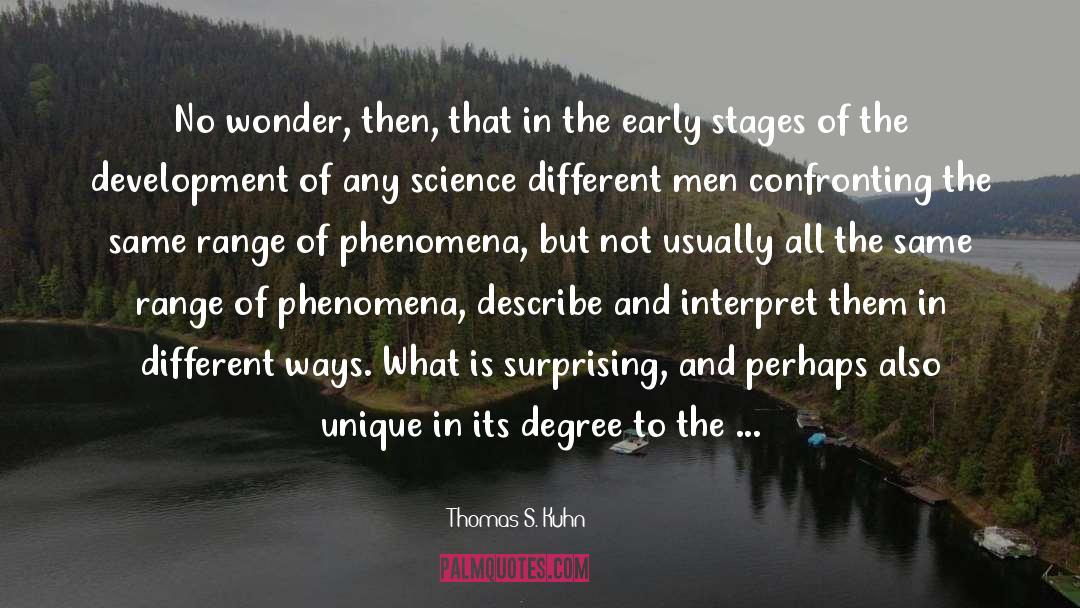
Out-of-date theories are not in principle unscientific because they have been discarded. That

....the power of a science seems quite generally to increase with the number of symbolic generalizations its practitioners have at their disposal.
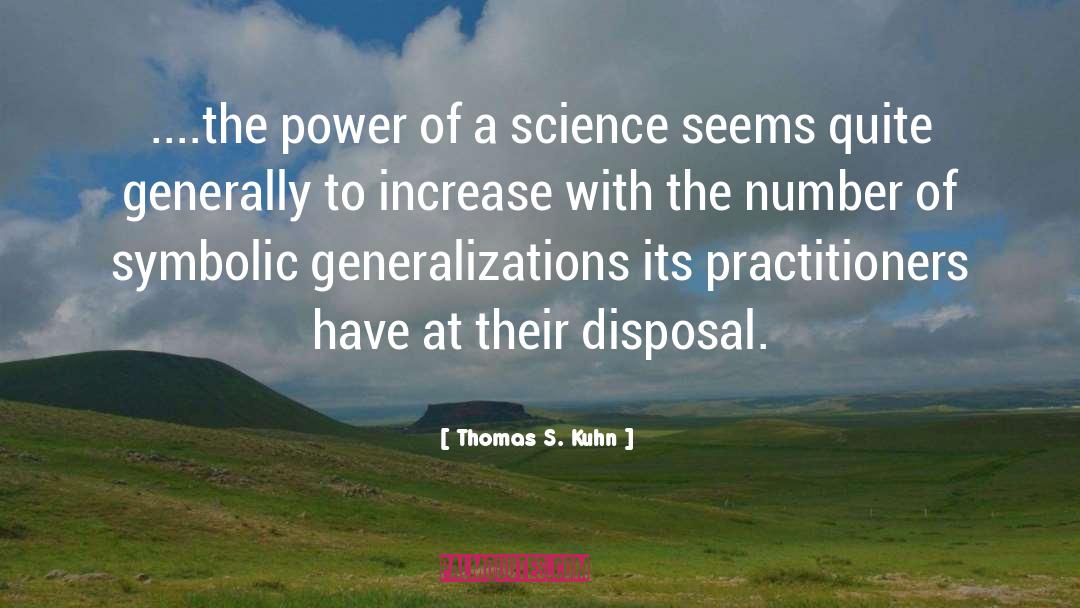
Almost always the men who achieve these fundamental inventions of a new paradigm have been either very young or very new to the field whose paradigm they change.15 And perhaps that point need not have been made explicit, for obviously these are the men who, being little committed by prior practice to the traditional rules of normal science, are particularly likely to see that those rules no longer define a playable game and to conceive another set that can replace them.
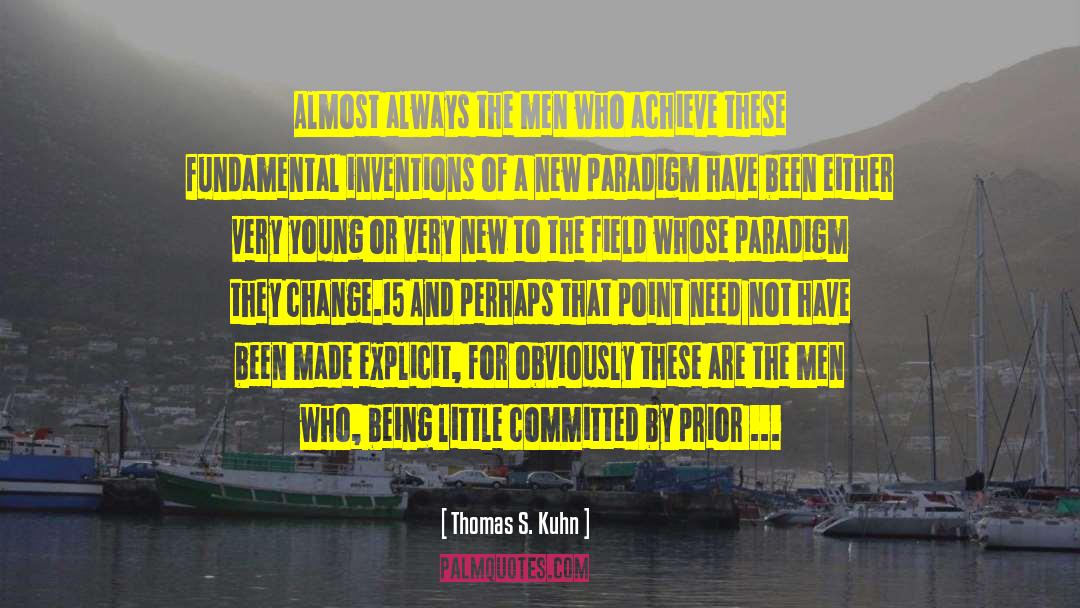
I may even seem to have violated the very influential contemporary distinction between "the context of discovery" and "the context of justification." Can

To reject one paradigm without simultaneously substituting another is to reject science itself.
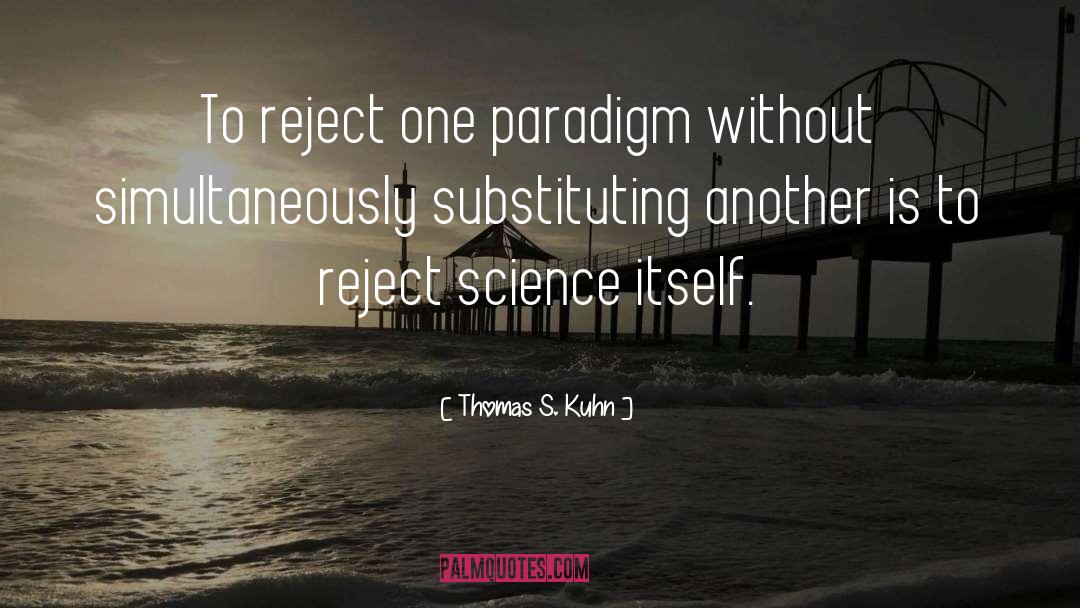
These three classes of problems-determinations of significant fact, matching facts with theory, and articulation of theory-exhaust, I think, the literature of normal science, both empirical and theoretical.
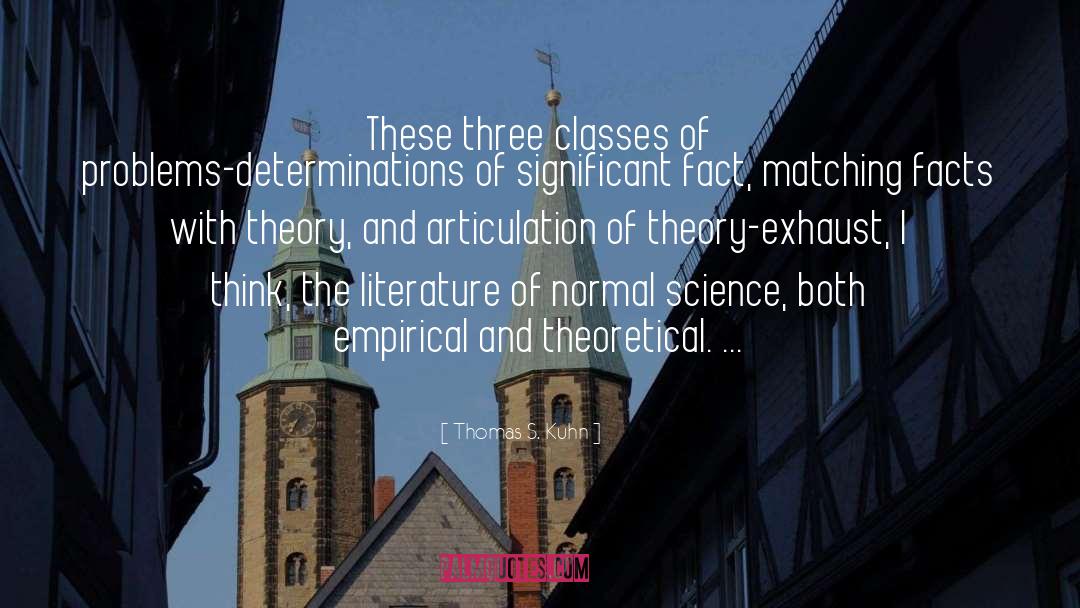
idiosyncrasy than

When reading the works of an important thinker, look first for the apparent absurdities in the text and ask yourself how a sensible person could have written them.

What man sees depends both upon what he looks at and also upon what his previous visual-conception experience has taught him to see.
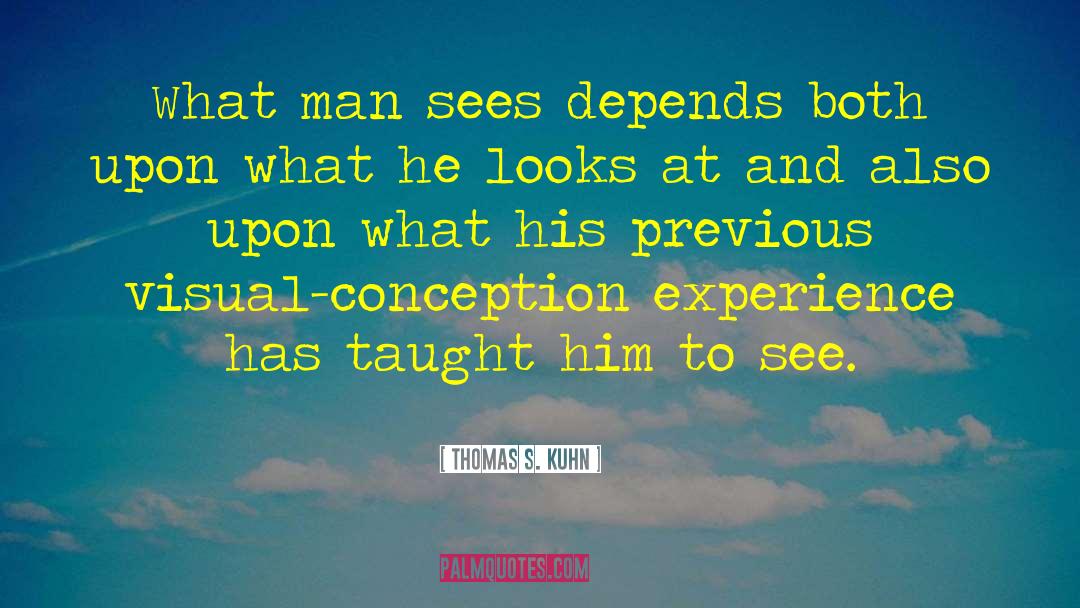
the process of learning a theory depends upon the study of applications, including practice problem-solving both with a pencil and paper and with instruments in the laboratory. If, for example, the student of Newtonian dynamics ever discovers the meaning of terms like 'force,' 'mass,' 'space,' and 'time,' he does so less from the incomplete though sometimes helpful definitions in his text than by observing and participating in the application of these concepts to problem-solution. That
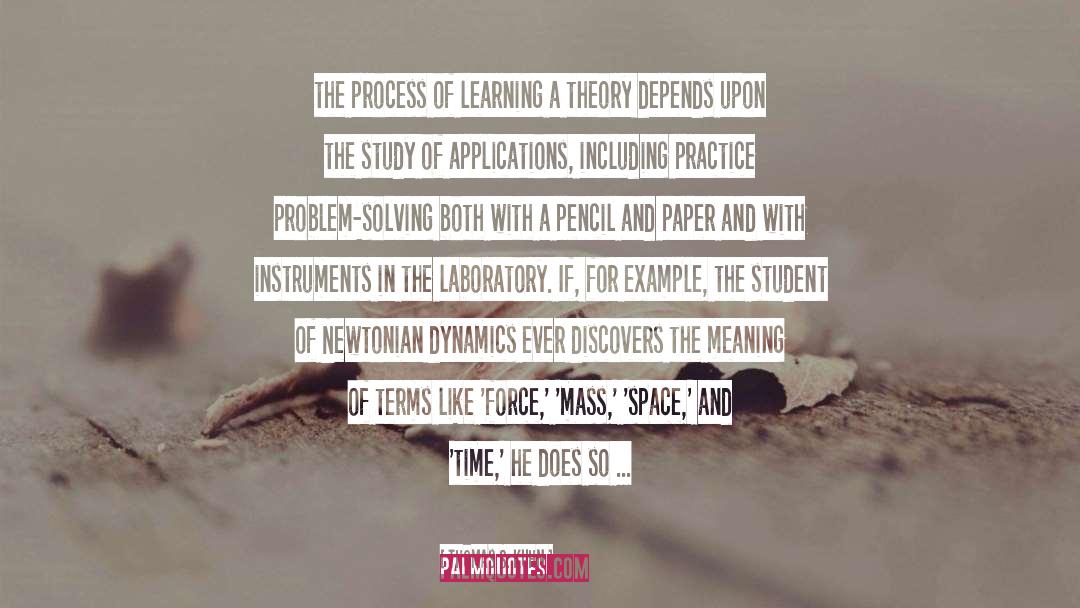
Its assimilation requires the reconstruction of prior theory and re-evaluation of prior fact, an intrinsically revolutionary process that is seldom completed a single man and never overnight

Under normal conditions the research scientist is not an innovator but a solver of puzzles, and the puzzles upon which he concentrates are just those which he believes can be both stated and solved within the existing scientific tradition.
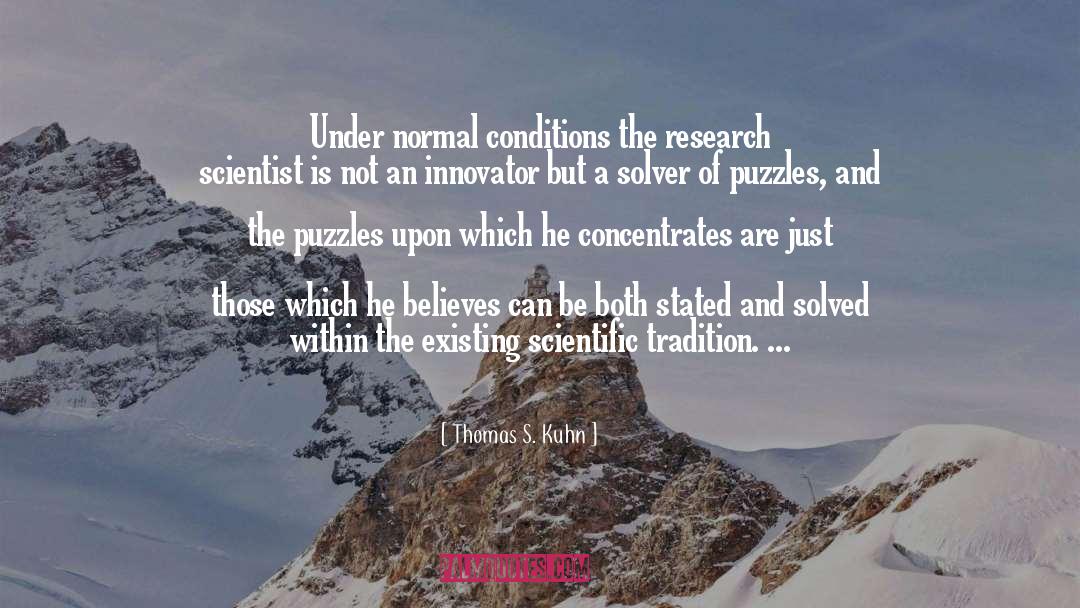
Because it demands large-scale paradigm destruction and major shifts in the problems and techniques of normal science, the emergence of new theories is generally preceded by a period of pronounced professional insecurity.

Very existence of science depends upon vesting the power to choose between paradigms in the members of a special kind of community.
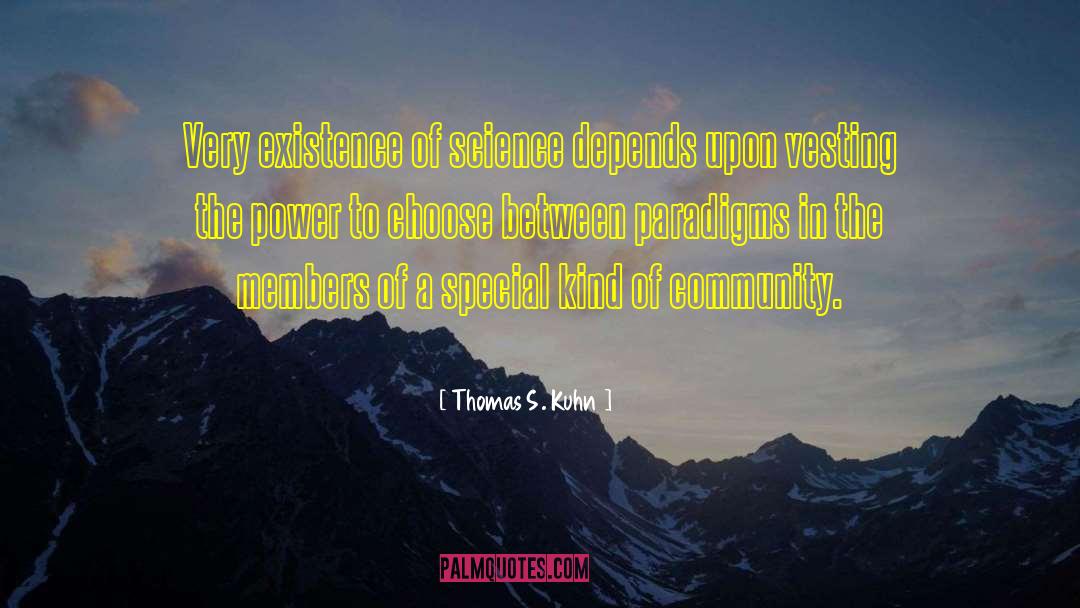
Through the theories they embody, paradigms prove to be constitutive of the research activity. They are also, however, constitutive of science in other respects, and that is now the point. In particular, our most recent examples show that paradigms provide scientists not only with a map but also with some of the directions essential for map-making. In learning a paradigm the scientist acquires theory, methods, and standards together, usually in an inextricable mixture. Therefore, when paradigms change, there are usually significant shifts in the criteria determining the legitimacy both of problems and of proposed solutions.
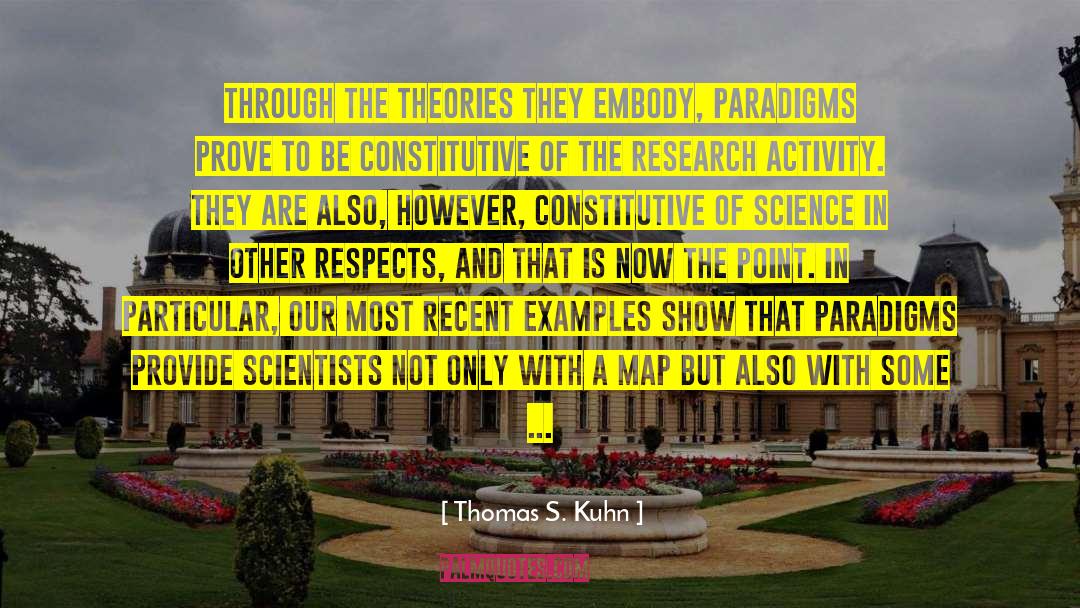
No language thus restricted to reporting a world fully known in advance can produce mere neutral and objective reports on "the given." Philosophical investigation has not yet provided even a hint of what a language able to do that would be like.

If these out-of date beliefs are to be called myths, then myths can be produced by the same sorts of methods and held for the same sorts of reasons that now lead to scientific knowledge
